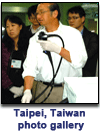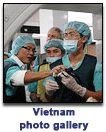 The ASGE Ambassador program is a philanthropic initiative designed to export two of the Society’s greatest assets — endoscopic medical care and training expertise — to areas around the world in need of such care. Direct access to GI care does not exist in all developing countries; therefore, educating and training physicians in underserved areas provides an opportunity for ASGE Ambassadors to make a significant impact at the global level. ASGE Ambassadors donate their time in order to share knowledge and expertise on the practice of gastrointestinal endoscopy and managing basic and advanced GI disorders. For more information, review the Ambassador Program Fact Sheet.
The ASGE Ambassador program is a philanthropic initiative designed to export two of the Society’s greatest assets — endoscopic medical care and training expertise — to areas around the world in need of such care. Direct access to GI care does not exist in all developing countries; therefore, educating and training physicians in underserved areas provides an opportunity for ASGE Ambassadors to make a significant impact at the global level. ASGE Ambassadors donate their time in order to share knowledge and expertise on the practice of gastrointestinal endoscopy and managing basic and advanced GI disorders. For more information, review the Ambassador Program Fact Sheet.
Because direct access to GI care does not exist in many developing countries, introducing quality education and training in these places is an opportunity for ASGE to extend the reach of GI internationally and make an enduring impact. The ASGE Ambassador Program is a philanthropic initiative designed to export endoscopic medical care and training expertise to areas of the world in need.
Due to funding constraints there are no future Ambassador Programs scheduled.
Program Info
Donate to the Ambassador Program
Questions? Contact Redi Jakova, Manager of Global Education and Engagement via email at rjakova@asge.org.
2017 Program
Romania
ASGE Ambassador Program Romania In September 2017, four Ambassadors traveled to Iasi, Romania for a three-day training at the Regional Institute of Oncology. The program provided didactic and hands-on training focusing on basic and more advanced polypectomy techniques (EMR, ESD), highlighting the importance of colon cancer screening, especially colonoscopic polypectomy to decrease the incidence of colorectal cancer. Thirty patients were treated during the program.
2015 Programs
Solomon Islands
The final ASGE Ambassador Program supported the Solomon Islands Endoscopy Training Program was held in February 2015.Despite limited prior experience with endoscopy the partnership in the Solomon Islands is yielding valuable information that can be used by the Ministry of Health to shape prevention and treatment policy. Findings of high rates of cancer as well as varices and ulcer disease have been recognized. Approaches toward mitigating these disease problems are beginning to be addressed. Local ownership and a close partnership with in-country training have contributed to the initial success of this program.
.gif)
Myanmar
The ASGE Ambassador Program was held in August 2015 in Yangon and Mandalay, Myanmar. The program was held at Mandalay General Hospital (MGH) in Mandalay and Thingangyun Sanpya General Hospital (TSGH) in Yangon and focused on ERCP (basic and advanced), EUS, EMR & ESD and provided training to 50 physicians from Myanmar. During the course of the program, approximately 50 patients were treated.
2014 Programs
Solomon Islands
A follow-up to the Ambassador Program in the Solomon Islands was held in conjunction with the Solomon Island Living Memorial Project at the National Referral Hospital (NRH) in April 2014. This marks the fifth ASGE sponsored endoscopy training partnership visit to Solomon Islands and followed up to the previous programs, held from 2011-2013. These programs have provided basic instruction in upper endoscopy, lower endoscopy and care and management of endoscopic equipment. Prior to these programs, the four surgeons at the NRH had no formal endoscopic training and their equipment was outdated and in poor condition. The physicians and nurses in the Solomon Islands are extremely motivated and work in relatively poor conditions with limited resources.
Serbia
The Ambassador Program Serbia was held in Belgrade, Serbia September 15-21, 2014. Thirty physicians participated in the program from Serbia, Montenegro, Macedonia, Bosnia, Croatia, Slovenia and Romania. The program focused on the diagnosis and treatment of colorectal cancer and premalignant lesions, pancreatico-biliary diseases, varices, portal hypertension and small bowel disease, including ERCP, EMR and EUS. Also, over 200 physicians participated in the didactic course and viewed the live cases through video transmission. Approximately 40 patients were treated.
Serbia Photo Gallery
2013 Programs
Cuenca, Ecuador
A follow-up to the 2011 program was held in December 2013 to train 31 physicians from throughout Ecuador. The clinicalfocus of the program was on upper GI tract malignancies and GI bleeding (variceal and non-variceal).
.gif)
Solomon Islands
A follow-up to the “hybrid” Ambassador Program in the Solomon Islands was held in conjunction with the Solomon Island Living Memorial Project at the National Referral Hospital (NRH) in January 2013.The training followed up to the previous programs, held in December 2011 and July 2012 and provided basic instruction in upper endoscopy, lower endoscopy and care and management of endoscopic equipment. Prior to these programs, the 4 surgeons at the NRH had no formal training and their current equipment was outdated and in poor condition.In the past year, the local endoscopy unit has performed approximately 200 endoscopies, 90% of which have been upper endoscopy and 10% colonoscopy.The physicians and nurses in the Solomon Islands are extremely motivated and work in relatively poor conditions with limited resources.
2012 Programs
Manaus, Brazil
In December 2012, four ASGE Ambassadors traveled to Manaus, Brazil for a week-long training which was carried out in collaboration with the Brazilian Society of Digestive Endoscopy. Various SOBED representatives also traveled to Manaus to assist in the training. The program provided endoscopic training in band ligation, sclerotherapy, PEG, EMR, dilatations, foreign bodies, clips, endoloops and argon plasma coagulation through didactic lectures, hands-on workshops and endoscopic procedures. A total of twenty-nine physicians participated in the program. There were many patients who otherwise would not have received treatment and some patients traveled 2-3 days by boat to receive care.More than 100 patients were treated over three days.
Taipei, Taiwan
In February 2012, four ASGE Ambassadors traveled to Taipei, Taiwan, to train thirty-nine physicians from Taiwan (and other southeastern Asian countries) in a week-long program that was carried out in collaboration with the Digestive Endoscopy Society of Taiwan (DEST) and two local ASGE Ambassadors.The program provided endoscopic training for treating pancreaticobiliary cancers and diagnostic and therapeutic ERCP. As a result, DEST will be working to establish a formal ERCP training and credentialing program in Taiwan.

2011 Programs
Cuenca, Ecuador
In November 2011, thirty physicians participated in hands-on training sessions conducted by ASGE Ambassadors. During the program, approximately 55 patients were treated with various diagnostic and therapeutic endoscopy procedures. The program focused on upper GI tract malignancies and GI bleeding (variceal and non-variceal).
Solomon Islands
Held in conjunction with the Solomon Island Living Memorial Project in December 2011, twenty physicians participated ina hybrid Ambassador Program consisting of hands-on training sessionson upper and lower endoscopy and proper management of equipment.Approximately twenty patients were treated during the program and the hands-on training had a significant impact on physicians' understanding of patient care. To read first-hand reports from two ASGE Ambassadors,click here.
2010 Programs
Hue City and Nha Trang, Vietnam
In November 2010, ASGE Ambassadors trained physicians from the north, central and south region during two separate educational conferences.

Cairo, Egypt
The information under Cairo program should be: In February 2010, ASGE partnered with the World Gastroenterology Organisation (WGO) to pilot the Ambassador Program at its training center in Cairo, Egypt. Physicians from Nigeria, Kenya, Sudan and Cairo participated in the training sessions. The program lasted a week and covered numerous topics related to upper gastrointestinal bleeding — one of the most common gastrointestinal afflictions facing developing nations in Africa today. The program consisted of didactic sessions and hands-on instruction; ASGE physicians and the invited trainees treated patients in need of procedures that were not commonly performed in the developing nations represented by the trainees. A significant number of patients in this area of the world suffer from esophageal varices that, when left untreated due to lack of physicians performing endoscopy, lead to death from internal bleeding. A follow-up to the training program was conducted to further educate, evaluate the progress of the newly-trained physicians and to assess the impact of the program.